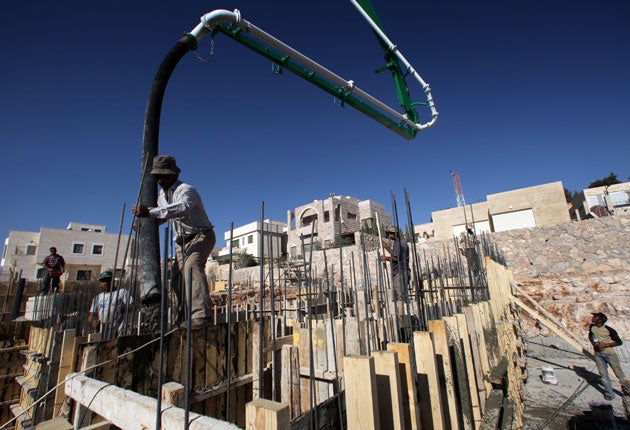Israelis weigh up US incentive plan to re-start peace talks

Your support helps us to tell the story
From reproductive rights to climate change to Big Tech, The Independent is on the ground when the story is developing. Whether it's investigating the financials of Elon Musk's pro-Trump PAC or producing our latest documentary, 'The A Word', which shines a light on the American women fighting for reproductive rights, we know how important it is to parse out the facts from the messaging.
At such a critical moment in US history, we need reporters on the ground. Your donation allows us to keep sending journalists to speak to both sides of the story.
The Independent is trusted by Americans across the entire political spectrum. And unlike many other quality news outlets, we choose not to lock Americans out of our reporting and analysis with paywalls. We believe quality journalism should be available to everyone, paid for by those who can afford it.
Your support makes all the difference.Israeli ministers yesterday began the fraught process of deciding whether to accept generous US incentives – including warplanes worth $3bn – in return for a 90-day moratorium on settlement building. The move is designed to restart peace talks with the Palestinians.
Prime Minister Benjamin Netanyahu gave his Cabinet the first outline of a US offer that the US hopes will persuade Israel to restore the partial freeze on Jewish settlement building in the West Bank, which the Palestinian President Mahmoud Abbas says is a minimum condition for resuming the talks.
Despite initial skirmishing, in which some hard-right-wing Israeli ministers declared their opposition to the proposed deal, Washington is expecting Mr Netanyahu to seek his colleagues' support for a new moratorium to replace the one that ended on 26 September, halting direct talks between the two sides in the conflict.
Diplomatic sources said the US is stipulating that building started since that date in the West Bank – estimated yesterday by Peace Now at more than 1,600 housing units – will be frozen. But it has accepted that a new moratorium, like the previous one, will not apply in East Jerusalem, where settlement construction has been a source of continued concern to the Palestinian leadership.
In return, the sources said the package of incentives offered by the US includes a pledge not to demand an additional moratorium after the 90 days runs out, and a promise to use its veto against "anti-Israel" resolutions submitted to the UN Security Council. This is designed to thwart attempts to persuade the UN council to ratify a unilateral declaration of a Palestinian state, the "Plan B" that the Palestinians have frequently floated in the event that talks fail to restart or bear fruit.
Under the package, discussed during seven hours of talks between US Secretary of State Hillary Clinton and Mr Netanyahu at the end of last week, the Administration would make a request to Congress to give the go-ahead for 20 F35 advanced fighter jets to maintain Israel's "qualitative edge" in strategic capability.
The New York Times yesterday quoted an unnamed official as saying that delivery of jets would be contingent on the signing of a peace agreement between Israel and the Palestinians. But a diplomatic source here cast doubt on this yesterday, suggesting that the aircraft were being offered in return for the settlement moratorium and that, though they are unlikely to come on stream for several years, they would be made available even if a peace agreement was not forthcoming.
Saeb Erekat, the Palestinians' chief negotiator, said the US had not yet given details of the proposals but that "they know we have a major problem in not including East Jerusalem". Mr Netanyahu told the Cabinet that the details had not been finalised but they would be presented to the 15-member security cabinet for a formal decision when they had been.
The package does not specifically include US backing for an Israeli military presence in the Jordan Valley, which Mr Netanyhau has been arguing should remain after the establishment of a Palestinian state, if there is one. But it does provide for separate US-Israeli talks on a new security agreement, to run in parallel with Israeli-Palestinian negotiations.
While Israel has conceded that future borders will be part of a fresh round of talks if they start, it is still resisting the idea that it should be the primary focus of the early stages.
Join our commenting forum
Join thought-provoking conversations, follow other Independent readers and see their replies
0Comments